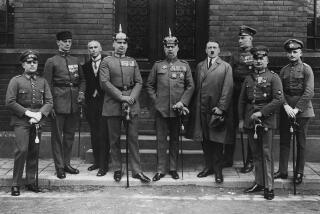Reagan Cites Soviet Rights Gains but Calls for More : Moscow Questions U.S. Right to Judge
- Share via
MOSCOW — The Soviet Union on Friday countered President Reagan’s criticism of its human rights record with accusations of its own that the United States is a major violator of human rights and not in a position to judge any other country.
The official news agency Tass, quoting an American human rights group, reported that the United States is holding more than 11,000 political prisoners, mostly Puerto Rican, Indian and black political activists.
Trud, the labor union newspaper, alleged that three women political activists are being kept in solitary confinement in maximum-security cells in a Kentucky prison and subjected to psychological torture. They could only leave the cells if they abandoned their political beliefs, Trud claimed.
At the same time, the Communist Party newspaper Pravda claimed that the United States had failed to ratify most of the major international agreements on human rights--16 of 22 remain unratified here--and raised the issues of homelessness and unemployment in the United States.
With the series of sharply worded articles in these and other major Soviet newspapers, Moscow was making clear--both to Reagan and to its own citizens--that the President will get a tough response when he brings up the human rights issue in his talks with Mikhail S. Gorbachev, the Soviet leader, during the summit here starting Sunday.
May Overshadow Summit
The articles on Friday contrasted sharply with the earlier, upbeat appraisals of summit prospects, and some American officials were concerned that the issue will now overshadow the whole five-day summit, diverting attention from other issues, particularly arms control.
Reagan not only gave a major address on the human rights theme Friday in Helsinki, Finland, but he also plans to raise the issue in a speech at Moscow State University, in a luncheon talk with Soviet writers, artists and other intellectuals and during a visit to a Russian Orthodox monastery.
Groups of Jews who have been denied permission to emigrate are planning demonstrations during the summit, and some American Jewish groups are planning to arrive in Moscow over the weekend and to demonstrate Monday or Tuesday, perhaps in Red Square at the center of Moscow.
On Friday, Richard Schifter, the assistant U.S. secretary of state for human rights, met here with Anatoly L. Adamishin, a deputy foreign minister, for pre-summit discussions of the issue. According to Tass, Adamishin raised several issues, including “the persecution of dissenters in the United States.”
While the Soviet Union is willing to discuss human rights questions with the United States on an equal basis, a senior Tass commentator said, Washington should not “pose as a moralist sitting in judgment on the whole world and attempt to lecture others on democracy and judge their record in the field.”
“Going out of their way to sell the United States as a ‘bulwark of democracy,’ ” Tass said, “they have kept up the confrontation rhetoric, making all manner of demands on this country and making all manner of terms and claims. This is an unacceptable, worthless attitude.”
11,000 Reported Held
Both Tass and Pravda quoted a report by the little-known group Prisoners of Conscience as saying that more than 11,000 people are being held for political reasons in the United States.
Trud, meanwhile, went further. It alleged in connection with the treatment of three women held in a federal prison in Lexington, Ky.: “There is no doubt that methods of exerting psychological pressure aimed at breaking the will of prisoners are being mastered there.”
Trud identified the three women as Susan Rosenberg, a Puerto Rican nationalist, and Silvia Baraldini and Alejandrina Torres, described as “fighters” for Third World freedom.
Other reports were carried by the government newspaper Izvestia, the army newspaper Red Star and the influential but conservative Sovietskaya Rossiya.
Alexander Bovin, a leading Soviet commentator, said later on television that Gorbachev is willing to discuss the issue as long as Reagan shows flexibility.
Human Rights Inspector
But Reagan had portrayed himself, Bovin said, as a kind of international human rights inspector.
“He will visit a monastery, and there it seems he will check out how things are with freedom of conscience,” Bovin said. “He will go to the writers’ house and will examine the Soviets on freedom of artistic creation. He will pat dissidents on the head and give recommendations on freedom of expression. And he will meet students and read them moral lectures on the delights of democracy and openness.”
Earlier, Soviet officials criticized Reagan’s plans to meet on Monday with about 40 dissidents, Jews who have been refused visas and Americans with dual citizenship who are attempting to leave.
“This kind of American action is far from seeking to improve relations between the Soviet Union and the United States,” another deputy foreign minister, Vladimir F. Petrovsky, said, describing the group as a “clearly tendentious selection” of people to meet.
Allegations Called Old
American officials said all the Soviet allegations were old and that most ignored the facts of the cases that were cited in an apparent attempt to put the two countries on a par.
One of the cases mentioned in the Pravda article, for example, was that of Leonard Peltier, an American Indian activist convicted of murdering two FBI agents in 1975.
More to Read
Sign up for Essential California
The most important California stories and recommendations in your inbox every morning.
You may occasionally receive promotional content from the Los Angeles Times.













